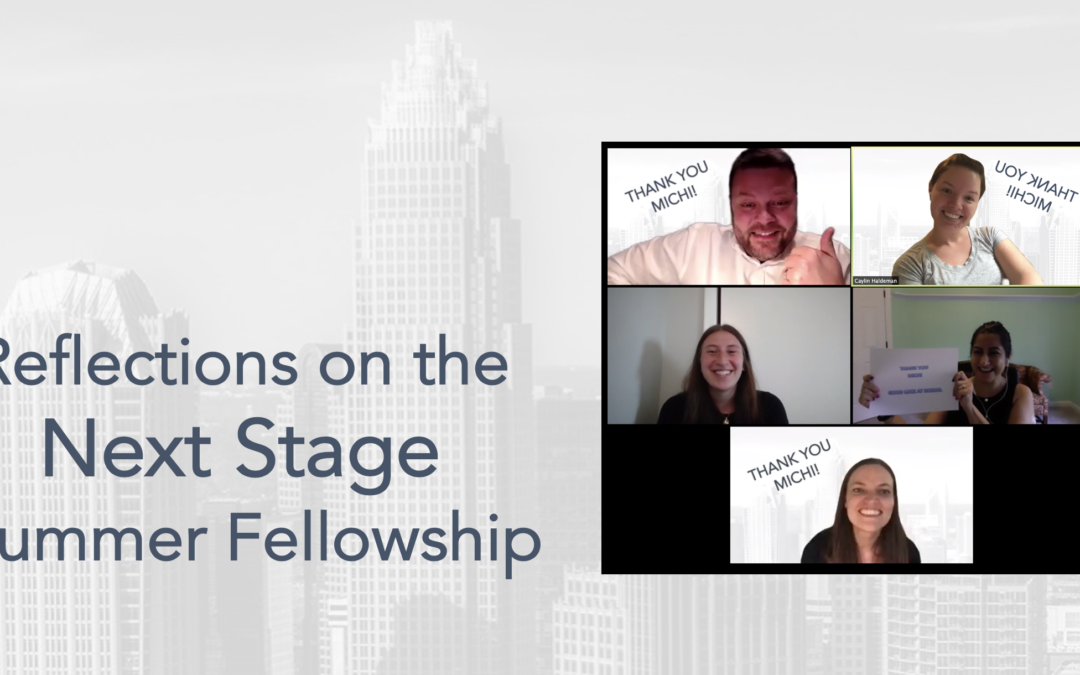by Michi LaCorte
Joining the Next Stage team in the midst of a global pandemic and getting to know them and the six CULTIVATE cohort organizations over Zoom has definitely been an unusual experience, but to say the least, I have made memories. I came into the Davidson Nonprofit Leadership Fellows program not knowing what to expect, but I think that working during such a unique time has provided me with a deep understanding of how communities come together in times of crisis.
It feels like the past two months have flown by, but I have learned a lot and have gained so much experience as Next Stage’s Summer Fellow. At the beginning of this summer I set three goals for myself:
From the Classroom to the Community – I have always felt that what is being learned in the classroom is only valuable if it is then applied outside of the classroom.
This summer, I wanted to understand if and how I could take what I have learned in my classes at Davidson and use that knowledge to strengthen communities and break down systems of oppression. As a Philosophy and Gender and Sexuality Studies major, it’s not always clear how my academic experience can translate to the ‘real world.’ In fact, I think the most common question I get is, “so, what are you doing to do with that degree?” Honestly, I didn’t really have a good response to that question. But this summer, seeing the work that Next Stage does with their nonprofit partners has given me so much insight into the possibilities of what’s to come next in my life.
I feared my career would have to be based on an earn-to-give model, working a job I was less than passionate about so that I could earn enough to give back — in other words, use my privilege of access to high-paying jobs to then redistribute wealth. Although this works for some, it’s on such a small scale and it still relies on systemic injustice. Not to mention, it means spending about 80,000 hours working a job I wouldn’t care much about.
The other option, I thought, was to live as some sort of moral saint, giving up most pleasure and comfort to serve. This would mean living a life of financial instability, even though the work I would be doing may be driven by passion. What I didn’t understand was that there is a way to build a career that is centered on service and is morally driven, but is also stable and financially sustainable. And this ties to what I have learned in my next goal.
A Focus on Financial Aspects – When I joined Next Stage, I knew next to nothing about the financial aspects of nonprofits.
Since then, I have come a long way. One of my core responsibilities this summer was to help conduct research by analyzing compensation of Executive Directors and CEOs of nonprofits in Mecklenburg County. Over the course of the summer, I looked at about 1,000 990 tax forms. Although to most that may not sound super riveting, I was able to see trends in compensation and learn about organizations that do good both through their mission-driven programming and through the stable and meaningful jobs they provide for leadership and staff.
I was always disillusioned with this idea that if you want to work in the nonprofit sector you have to sacrifice a level of financial comfort. But I learned this summer that nonprofit compensation isn’t just set on a whatever-you-can-pay basis, but it is actually a strategic decision based on the scope of one’s role and how others in the field who do similar work are being compensated.
How to Build from the Ground Up – I learned so much about building nonprofits from the ground up from working with Community Matters Cafe, Feeding Charlotte, Foster Village Charlotte, Hope Vibes. Soccer Foundation of Charlotte and the West Side Community Land Trust.
I had the amazing experience of working with the six organizations in CULTIVATE. The curriculum is full of information about nonprofit management and organizational development and although I wouldn’t say I am ready to start one just yet, I definitely feel like I know what some of the most important steps are. During the monthly group workshops, I learned the importance of continuously assessing community needs and having a strong brand with strong values that align with the needs you are equipped to address.
The problems of the world are daunting when you look at them on a large systemic and conceptual scale, but what I’ve learned this summer is this: if you work on a small scale, within a community, and on a targeted issue, you can have a great impact. It may not live up to the dream of saving the world, but service and altruistic work shouldn’t be about that. What matters is that you’re using whatever it is you can offer to do valuable work that creates lasting and needed change. This is definitely what the Next Stage team does, and I am so grateful to have been a part of it this summer.
